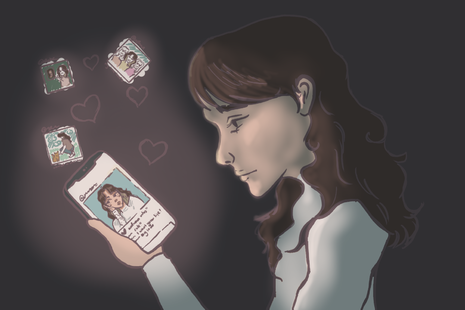The honesty of Cambridge vloggers
Grace Howell speaks with student content creators as they aim to document the authentic realities of student life

In the weeks leading up to Freshers’ Week, I immersed myself in Cambridge vlogs that captured the city’s beauty. My familiarity with the city may have grown, yet so did a pervasive, gnawing anxiety. Lost within other people’s experiences, Cambridge morphed into a place where your closest companions were textbooks and computers, only to end up with two numbers that defined your worth.
This article began as an attempt to remove the camera lens, peel back layers of editing, and fracture the rose-coloured glasses, proving that Cambridge vloggers presented an improbable reality. Yet I realised I was not stripping away their illusion, but dismantling my own.
Cambridge vlogs are no longer highlight reels of a perfect student life: through authenticity and openness, they capture how the student identity is inseparable from being human. Isabelle Yanran (@Yanran) explains that one of her motivations for vlogging was to contradict the vlogs that depicted a life of constant studying, and being chained to the desk. She aims to show how Cambridge, “is actually not boring and all bad”.
“I realised I was not stripping away their illusion, but dismantling my own”
Erin Meryl, (@Erinmerylstudy) notes that before COVID-19, vlogs were glossy portrayals of student life; a person standing on top of a mountain of success, with their viewers’ admiration down below. Today, however, vlogs “help the audience go on the journey together” to success, as Erin described.
Yet she acknowledges that all vlogs involve a degree of ‘curated vulnerability’, with each video crafted to the vlogger’s intentions. Isabelle also admits that she considers what entertains viewers, which sometimes results in removing vulnerable moments. Nevertheless, by including discussions of mistakes, unproductive days, and weaknesses alongside the many highs of Cambridge, they develop a culture of honesty among vloggers and shift student mental health in the process.
The progression towards being more open and authentic in Cambridge vlogs seems to have been influenced by the very toxic and somewhat impermeable image of the ‘Cambridge student’: not a person, but an academic machine. Presenting moments of vulnerability is to reveal the cracks in this superficial, unattainable ideal.
“Not a person, but an academic machine”
Youtuber and Instagrammer Jade Marix (@Jademarix_3) aims to dismantle this image because she knows that being at Cambridge, “doesn’t make me immune to such challenges.” Her videos include moments of unproductivity and tiredness during the term, alongside the thrills of university life. Moreover, Li Xuan (@Lixuan’s Diaries) notes the “pressure is very real” to act as the ideal student on screen. She took a break from vlogging when struggling during the academic year, because to show hardship “meant that I wasn’t managing everything well like the ideal Cambridge student.”
COVID-19 contributed to expediting the shift towards greater vulnerability and honesty. The “accelerated positive momentum to raise awareness” as the UN described from the pandemic has clearly seeped into Cambridge vlogs.
“Her videos include moments of unproductivity and tiredness during the term, alongside the thrills of university life”
This consequent cultural shift is reflected in how vloggers now feel compelled to share difficult moments. Isabelle argues that, “if I film a vlog and get upset, then it feels like I’m lying if I don’t put that in.” Jade also echoes this, admitting that, “it’s important to continue being honest because I’m also still trying to figure out how to be an adult.”
The emerging message is clear: our student identity cannot be separated from being human, and mistakes as much as successes come with that. As Millie Hine describes, these vlogs are a “mini portal” which provides guidance and reassurance for future Cambridge students.
However, the impact of these vlogs reaches beyond the first weeks of term. The discussions of imposter syndrome and unproductivity in the vlogs render these lingering doubts less overwhelming for students. Sheng Ouyang explains that vlogs “remind me that everyone feels this way, making it easier to talk to others about insecurities.” In an arduous, high-pressure environment, normalising these struggles is crucial for improving student mental health. These vlogs remind us, as Millie reflects, that “we are all human beings.”
“Vlogging still has further to go, with room for greater openness and less fear of judgment”
Yet the vlogs support not only the viewers but also those who hold up the camera. All the vloggers noticed an improvement in their mental health by talking through insecurities and doubts. Though they may never see their viewers, as Isabelle describes, the camera almost becomes like a “friend” and vlogging as an act of “continuous journalling”. These videos create a space and a starting point where her friends share similar feelings, “validating how you feel.”
Li Xuan posted an inspiring, honest reflection of her first year at Cambridge, where she talked through some of the hardships she endured. When asked how it felt to post the video, I expected the answer to be one of anxiety or sadness. Instead, she felt “at peace” as it “released all the pent-up angst and disappointment I’ve felt towards myself for not being the perfect student.” Once only a tool of performance, the camera has become an emotional release for many vloggers, where imperfection when spoken aloud is as potent as success. As Li Xuan described, “to pour my heart and soul into creating videos that convey my genuine thoughts is the intrinsic drive that keeps me going.”
Each vlogger revealed a developing culture of honesty and vulnerability in vlogging. Yet there is still further to go, particularly in fostering openness and reducing the fear of judgment. Jade mentioned the struggle of recording vulnerable moments: “I end up overthinking the message, which often stops me from posting.” However, with each post, she feels her confidence building by “listening back to my thoughts and thinking how to make them clearer for myself” and “working through perfectionist tendencies.” Jade’s attitude and those of the other vloggers reveal a shifting mentality of the online image Cambridge students choose to express, one that is more welcoming, open, and human.
For the 2025 incoming freshers, these vlogs may not provide a map of every step, but at least illuminate the beginning of the path. Vlogs provide a starting point of shared vulnerability and a reminder that being a student is inseparable from being human, which entails experiencing both highs and lows when studying here at Cambridge University.
 News / Judge Business School advisor resigns over Epstein and Andrew links18 February 2026
News / Judge Business School advisor resigns over Epstein and Andrew links18 February 2026 News / Hundreds of Cambridge academics demand vote on fate of vet course20 February 2026
News / Hundreds of Cambridge academics demand vote on fate of vet course20 February 2026 News / Petition demands University reverse decision on vegan menu20 February 2026
News / Petition demands University reverse decision on vegan menu20 February 2026 News / CUCA members attend Reform rally in London20 February 2026
News / CUCA members attend Reform rally in London20 February 2026 News / Gov grants £36m to Cambridge supercomputer17 February 2026
News / Gov grants £36m to Cambridge supercomputer17 February 2026










